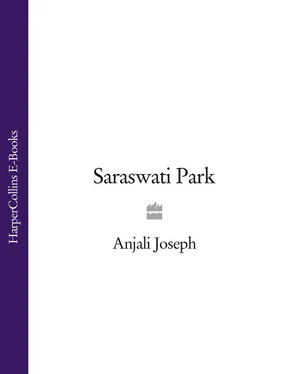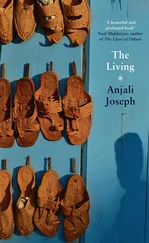Soon after the boy from the Sainath Tea House made his first round with a small metal plate on which he carried hot glasses of tea, another regular appeared. This was a cripple, with maimed legs and shortened arms. He looked as though he was in his twenties, and crawled surprisingly fast on his hands and knees; his pelvis, the only part of his body that was clothed, lurched between his legs like a cranky motor between twisted pistons. He skirted Mohan and came to a halt, smiling expectantly, in front of Bablu, the youngest letter writer. Bablu was a mere child, in his late thirties; he had been at the job only twelve years. He looked over the top of his table, saw the cripple, and passed a few coins down; the other man took them and, satisfied, went away wordlessly. This happened every day at the same time but none of the letter writers commented. Mohan sometimes amused himself by spinning out scenarios: the two boys were brothers, but by different mothers; the more fortunate one knew that only his good luck had saved him from his brother’s fate…the baroque suppositions made him smile, mostly at himself.
He’d been thinking again about the woman in the green sari, partly with a simple fascination, as when a particular face, or a gait, something alluring about a woman walking past, caught his eye. But then he’d begun to think of her in a different way, giving her a name that wasn’t the one he’d written on the money order form, and picking up a thread in his mind about her story, where she’d come from, how she’d arrived in Bombay, what she felt about her life, the kind of room she might live in. These details lingered in his head, and he looked up absently into the traffic to see two green parrots shoot past the GPO and towards Bhatia baug, making an elegant arc of speed through the air, their feathers flashing electric green as they corkscrewed. They were gone before he could be quite sure he hadn’t made them up, but he smiled again, suddenly feeling luckier.
The day extended, shapeless, because the usual bookstall excursion wasn’t there; the thought of the blank pavements between Fountain, Churchgate and the University made him feel strange, as when in a dream you open a favourite volume only to find page after page unaccountably empty.
Soon enough customers came along – first, a man who wanted to fill out a passport application. When he had taken the completed form and gone, Mohan leaned back in his chair and watched the shadow pigeons take off, wheel wildly, then land in the shadow tree, and merge into its substance. Later, a shadow leaf would seemingly tear itself out of the tree and fly up, into the sunlit sky.
That afternoon he was coming to the end of his lunch – its components neatly laid out on his table, three different small boxes for daal, vegetable and chapatis – when a familiar figure, knife-thin, appeared in his field of vision.
‘Eh, Ashish!’
The boy approached, slowing as he got nearer the tarpaulin. Four men looked at him interestedly. He smiled in a measured but general way and came to a stop near his uncle.
‘Come, sit here.’ Mohan patted the stool next to him.
‘No, I just…’
‘Sit!’
Ashish sat down, reluctantly. But when he’d moved into the world under the tarpaulin, only a metre distant from the road, he began to look about him with curiosity.
Mohan waved towards him for the benefit of the other letter writers. ‘This is my nephew Ashish, my sister’s son. Studying at Elphinstone College.’
Khan smiled at Ashish and examined him closely through his tiny glasses. ‘You are studying…’
‘Yes.’
‘Which stream? Which year?’
‘Um, third year BA.’
A doubtful look passed over Khan’s face. ‘BA?’ he repeated incredulously, as though it was hard for him to believe anyone could be such a malingerer.
‘Arts,’ muttered Ashish.
‘Literature,’ said Mohan firmly. ‘He’s studying English literature.’ He put a hand on one of the boy’s thin shoulders.
‘Um, Mohan mama, can I have the key?’ Ashish murmured rapidly. ‘I don’t have one yet, mami said to get it from you in case she was still out.’
The boy from the tea house reappeared with another round of glasses.
‘At least stay and have tea with me,’ Mohan said. ‘Have you had lunch?’
Ashish looked embarrassed, and also unencouraging. ‘I’ll eat at home,’ he said.
Mohan hadn’t yet eaten his puran poli; he’d been saving it till the end because it was his favourite sweet. ‘Here,’ he said, putting it into the boy’s hand. ‘Eat this and have some tea. Anyway, I shouldn’t have all these things at my age, I’ll get fat.’ He patted his stomach and grinned.
Ashish, now that he had been forced into staying, sat quite contentedly and munched the puran poli.
‘You don’t know how busy it used to be, earlier. People coming all the time, we didn’t even have time for lunch until four o’clock,’ Khan told him. Ashish sipped his tea and nodded sagely.
‘Hm.’ Mohan cleared his throat. The boy, even as a child, had had a gift for sitting still and doing little that had easily allowed them to be close. Mohan watched a couple of buses turning the corner from the GPO towards Ballard Estate and seemed to see them as Ashish did: big harmless animals, some thing like oversized water buffaloes, their engines breathing and hydraulic brakes hissing as they turned. The boy looked at the curved frontage of the nearby buildings and Mohan’s eyes followed his and noticed, today, how the air conditioners were suspended from the facade in metal cages, like strange, rusting offerings.
‘So, what work did you have in town?’ Mohan asked.
‘I had to check something in the library,’ but he wasn’t carrying any books, ‘and I met a friend.’
‘Hm.’
Ashish’s tea was over, and his reverie had passed. ‘Well,’ he said, standing up, ‘I’ll go.’ He nodded at the other letter writers.
‘See you at home!’ Mohan called, and waved. He continued to look after the thin figure as it receded towards the station.
‘So you think he’ll pass this year?’ Khan asked. He pushed his spectacles up his nose and reopened the morning’s paper.
‘Definitely,’ said Mohan resolutely. ‘Very intelligent boy. And he’s studying hard, now.’ He cleared his throat and remained staring into the brightness for a while.
He reminded himself as he dressed that Sunday that lunch should go well no matter what. Satish was coming over for his birthday; Lakshmi had for days been planning what to cook, muttering to herself to use less salt since her brother suffered from high blood pressure; a present had been bought and wrapped. Mohan pulled out his Sunday clothes – a sort of t-shirt with a collar that Megha had given him, and old, comfortable trousers – and resolved not to be provoked by Satish. He put on his sandals without disturbing his wife, who lay sleeping under the fan. It was turning so frenetically in the early morning high voltage that the sheet covering her stirred, and exposed the instep of one foot.
As he went down the stairs he noticed the smell and coolness of the air. Sunday morning in Saraswati Park and all over the city was a time of languor. The routines and efforts of other days were performed, but at a smaller scale and a slower pace; suddenly, there was time to live.
He padded into the lane. The usual figures emerged from their gates, coming towards the shops for bread and milk; today they were dressed not in neatly pressed trousers and shirts but in voluminous t-shirts and shorts. An older man wore white kurta-pyjama. A couple of ghostly forms still promenaded at the end of the lane, taking their morning walk, but there was absenteeism, and a sense of festivity even in the movements of the stalwarts.
Читать дальше












